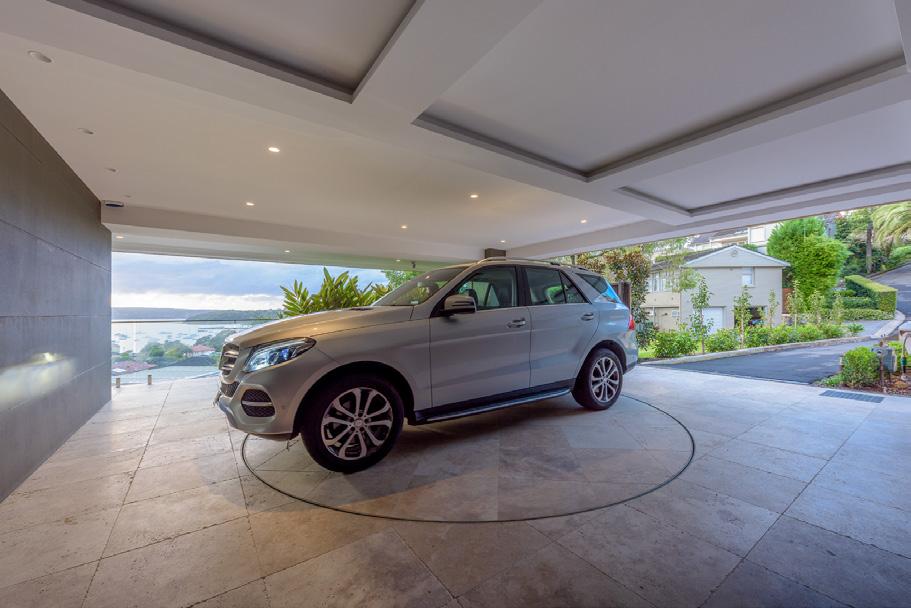

TOP MOVERS 2025 MOVING

Drive the new way.
New IVECO S-Way: high technology and efficiency on all missions
A wide choice of Euro III / V diesel engines, delivering class-leading power from 360 hp to 560 hp Euro III / 570 hp Euro V and superior fuel economy. 12-speed HI-TRONIX automated transmission with the most advanced technology in its category, electronic clutch and best-in-class torque-to-weight ratio. Full range of fuel-saving devices, such as anti-idling feature, EcoSwitch, Ecoroll and Smart Alternator. Top levels of comfort and safety, with a completely redesigned and reinforced cab, featuring enhanced direct visibility and enlarged cab livability.
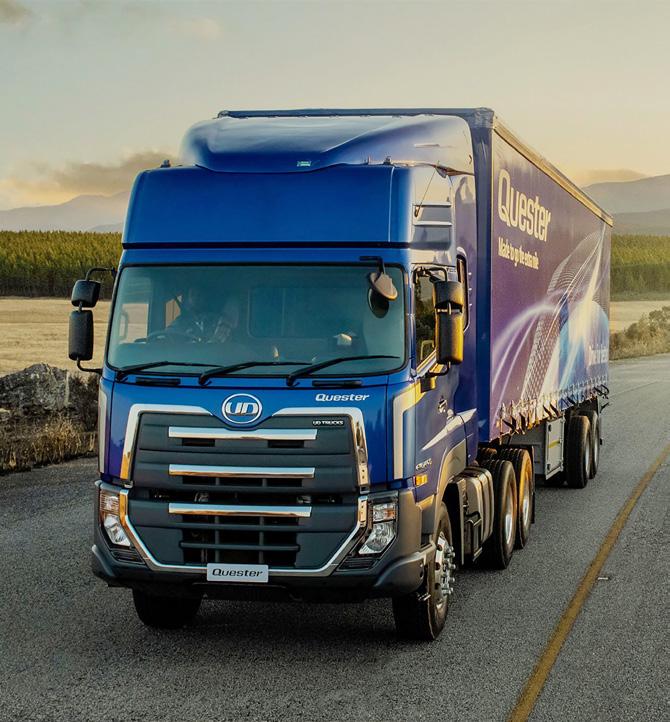
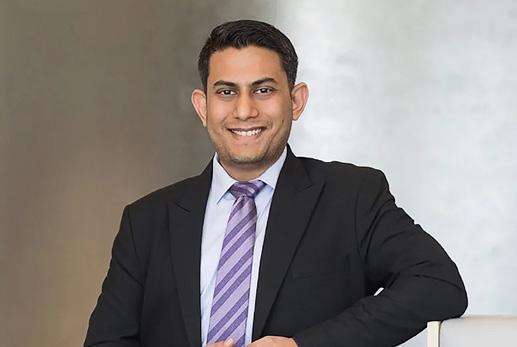


Nestled by the coast of Lusail sits the splendor of Raf es and Fairmont Doha, where luxury is rooted in even the smallest details. Open the doors to mesmerizing hospitality and make memories in a world of sophistication.

CONNECTING TRADE PROFESSIONALS WITH INDUSTRY INTELLIGENCE
CONNECTING TRADE PROFESSIONALS WITH
CEO
Wissam Younane wissam@bncpublishing.net
Managing Director
CEO
Rabih Najm rabih@bncpublishing.net
Wissam Younane wissam@bncpublishing.net
Group Publishing Director
Director
Joaquim D’Costa jo@bncpublishing.net
Rabih Najm rabih@bncpublishing.net
Commercial Director
Group Publishing Director
Andrea Mocay andrea@bncpublishing.net
Joaquim D'Costa jo@bncpublishing.net
Editor-in-Chief
Editor Aya Zhang aya@bncpublishing.net
Vibha Mehta vibha@bncpublishing.net
Digital Reporter
Managing Editor
Reeba Asghar reeba@bncpublishing.net
Kasun Illankoon kasun@bncpublishing.net
Creative Lead
SUBSCRIBE
subscriptions@bncpublishing.net
SUBSCRIBE
subscriptions@bncpublishing.net
PO Box 502511 Dubai, United Arab Emirates P +971 4 4200 506 | F +971 4 4200 196
For all commercial enquiries, contact jo@bncpublishing.net T +971 50 440 2706
PO Box 502511 Dubai, United Arab Emirates P +971 4 4200 506 | F +971 4 4200 196
Christian Harb chriss@bncpublishing.net
Design Christian Harb
Editorial Design
Marketing Executive
Rizaldi Febrian
Aaron Joshua Sinanbam aj@bncpublishing.net
Marketing Executive
Digital Media Producer
Aaron Joshua Sinanbam aj@bncpublishing.net
Alexander Bungas
Videographer
Eduardo Buenagua

All rights reserved © 2025. Opinions expressed are solely those of the contributors. Logistics News ME and all subsidiary publications in the MENA region are officially licensed exclusively to BNC Publishing in the MENA region by Logistics News ME.
For all commercial enquiries, contact jo@bncpublishing.net T +971 50 440 2706 All rights reserved © 2023. Opinions expressed are solely those of the contributors.
No part of this magazine may be reproduced or transmitted in any form or by any means without written permission of the publisher.
Logistics News ME and all subsidiary publications in the MENA region are o cially licensed exclusively to BNC Publishing in the MENA region by Logistics News ME.
Printed by United Printing and Publishing | upp.ae
No part of this magazine may be reproduced or transmitted in any form or by any means without written permission of the publisher.
Printed by United Printing and Publishing | upp.ae
Images used in Logistics News ME are credited when necessary. Attributed use of copyrighted images with permission. All images not credited courtesy Shutterstock.
In addition to our print edition, we’re bringing you all sorts of industry news on our web mediums. We’re looking forward to interacting with our readers on all of our social media and web platforms. See you on the web!
addition to our we’re bringing you all sorts of industry news on our web mediums. We’re looking forward to interacting with our readers on all of our social media and web platforms. See you on the web!



if you were asked whether the journey or the destination is more important, what would your answer be?
I used to think it’s the destination early on. But then I came to the realisation that there is so much in the journey itself. The challenges throughout make the reward more appreciated. And sometimes the journey passes so quickly that we barely notice it before moving on to the next step. Yet, is that all that matters? Or is there something deeper in the experience along the way?
Recently, I found myself reflecting on the people I’ve met throughout my life. I consider myself fortunate to have been surrounded by good hearted and generous individuals. One memory that stands out is when I was in high school, I was interviewed by a media channel because of my good performance in Arabic, which was considered unique given my Chinese background living in Lebanon. That recognition led to a family offering to contribute towards my university tuition, a gesture I remain deeply grateful for to this day.
That feeling of gratitude, that sense of human connection, is remarkable. It’s a reminder that what makes us truly human is our capacity to connect, to give, and to support one another in unexpected ways. These bonds shape our journeys and enrich our destinations.
So perhaps when weighing the journey against the destination, the real question is about the company we keep along the way, the people we meet, the relationships we build, and the moments of kindness we share without expecting anything in return. It’s in these connections that life finds its true meaning.
Maybe it’s not about choosing between the journey or the destination at all, but about embracing the shared humanity that connects us throughout both.
Aya Zhang Editor aya@bncpublishing.net
Xiaoyue (Aya) Zhang xiaoyuezhangg












































































DUBAI SOUTH LAUNCHES ADVANCED MULTIUSER FACILITIES IN LOGISTICS DISTRICT
Dubai South, the largest single-urban master development focusing on aviation, logistics, and real estate, has announced the launch of state-of-the-art multiuser facilities at the Logistics District. Spanning a built-up area of approximately 215,278 sq. ft., the new facilities comprise combinable units that offer flexible solutions to accommodate the diverse needs of businesses, fostering growth and enhancing competitiveness in the regional market.
Strategically located within the freight forwarding zone, the facilities offer unparalleled proximity to key transport hubs, including Al Maktoum International Airport and Jebel Ali Port. Businesses also benefit from direct access to the UAE’s key road network, ensuring seamless connectivity for efficient logistics and operations. The development will be completed and handed over
to tenants to commence operations by Q1 2026.
The facilities provide flexible, airconditioned, combinable spaces with ground-level access. Built with sustainability in mind, the space allows for easy fit-out customisation to suit diverse business needs. On-site retail outlets and amenities further enhance convenience for businesses and their employees.
These facilities cater to a wide range of clients, including SMEs, logistics providers, e-commerce companies, traders, and businesses reliant on secure and strategically located spaces for international trade.
Two size options are available—2,152 sq. ft. and 3,767 sq. ft.—offering flexible space configurations that allow companies to scale as their needs grow. All units are temperature-controlled to ensure that products and services are kept in optimal conditions.
In his comments, Mohsen Ahmad, CEO of the Logistics District, Dubai South, said: “At Dubai South, we are committed to empowering businesses with innovative, flexible, and sustainable solutions that drive growth and operational efficiency. The launch of our new multiuser facilities underscores our commitment to supporting SMEs by providing strategically located, state-of-the-art infrastructure that meets the evolving demands of the regional and global markets. We continuously strive to create an ecosystem that fosters SME growth by offering tailored solutions, strategic connectivity, and a businessfriendly environment.”
Representing the pinnacle of logistical innovation encapsulated within a premier infrastructure network, Dubai South’s Logistics District offers premier services and operations as well as uninterrupted access to Jebel Ali Port via a bonded logistics corridor. The district comprises multiple zones, which have direct access to the cargo terminals at Al Maktoum International Airport; EZDubai, a fully dedicated e-commerce free zone; and a Contract Logistics Zone.
EMIRATES POST & DHL EXPRESS UAE JOIN FORCES TO LAUNCH ‘EXPRESS EASY’
Emirates Post, the UAE’s official postal service provider, has signed a strategic agreement with DHL Express UAE, the global leader in international express logistics, to launch DHL’s ‘Express Easy’ service at select Emirates Post branches. The partnership marks a landmark milestone in developing the national postal network into a globally connected service platform that prioritises simplicity, access, and customer empowerment. Furthermore, it reflects both entities’ shared commitment to providing agile, customer-focused solutions that support the evolving needs of individuals, entrepreneurs, and SMEs.
DHL’s ‘Express Easy’ service aims to streamline international shipping by offering a user-friendly and all-inclusive pricing, making it easier for individuals and small businesses to send packages all across the globe with greater ease and transparency. Moreover, by integrating DHL’s trusted global
logistics capabilities with Emirates Post’s local expertise and reach, the initiative strengthens the UAE’s stature as a leading international trade and e-commerce hub.
This collaboration with DHL marks a strategic milestone in a broader strategy to transform Emirates Post branches into dynamic hubs offering a wide range of services to serve individuals and businesses.
With a legacy of trusted service in the UAE, DHL continues to connect the nation to over 220 countries and territories worldwide, empowering customers to trade, grow, and connect globally with confidence.
Together, Emirates Post and DHL are creating smarter, more connected logistics solutions that drive innovation, support economic growth, and make global shipping easier for everyone in the UAE.

DP WORLD SIGNS USD 800 MILLION DEAL TO TRANSFORM SYRIA’S PORT OF TARTUS
DP World has signed a landmark 30-year concession agreement with Syria’s General Authority for Land and Sea Ports to develop and operate the Port of Tartus, marking a significant step in the country’s post-conflict economic recovery.
As part of the agreement, DP World will invest USD 800 million over the concession period to upgrade the port’s infrastructure and transform Tartus into a critical regional trade hub linking Southern Europe, the Middle East and North Africa.
The agreement was formally signed in Damascus in the presence of His Excellency Ahmed Al-Sharaa, President of the Syrian Arab Republic, by Sultan Ahmed bin Sulayem, Chairman and Group CEO of DP World, and Qutaiba Ahmed Badawi, Chairman of the General Authority for Land and Sea Ports.
Structured under a Build-Operate-Transfer (BOT) model, the project will see DP World fully own and operate the port for the duration of the agreement. The investment will deliver new infrastructure, modern cargo-handling equipment, and
digital systems aimed at significantly enhancing operational efficiency across both container and general cargo terminals.
“This agreement reflects our long-term commitment to enabling global trade and creating resilient supply chains,” said Sultan Ahmed bin Sulayem. “We see strong potential in Tartus to serve as a vital trade gateway and look forward to strengthening regional connectivity and economic opportunity through this investment. We believe in the power of trade to help drive long-term stability and prosperity for Syria and the region.”
Qutaiba Ahmed Badawi, Chairman of Syria’s General Authority for Land and Sea Ports, commented: “This agreement marks an important step forward for the Port of Tartus and Syria’s maritime sector. Partnering with DP World will allow us to modernise and strengthen the efficiency of our trade infrastructure as we continue to rebuild key trade lanes, support the national economy, and provide more opportunities for the Syrian people. The agreement reflects our shared vision to transform Tartus into a strategic gateway linking Syria with regional and international markets, and it will pave the way for sustainable growth for years to come.”

Situated on Syria’s Mediterranean coast, Tartus is the country’s secondlargest port and a key maritime hub for trade routes spanning Europe, the Levant, and North Africa. Its strategic location complements existing maritime routes through the Bosporus and the Suez Canal, reinforcing its potential as a regional logistics centre.
The redevelopment will expand the port’s capacity to handle general cargo, containers, breakbulk and roll-on/roll-off (Ro-Ro) traffic. DP World also plans to explore the development of free zones, inland logistics hubs, and regional transit corridors in collaboration with local stakeholders— efforts that align with Syria’s broader strategy for economic diversification and sustainable growth.
DHL AVIATION LAUNCHES XCELERATE TO REDEFINE EXPRESS AIR FREIGHT
DHL Aviation, the aviation business of DHL Express, has launched Xcelerate, a premium fast-track airport-to-airport cargo product designed to offer customers priority shipping and superior service. This innovative offering provides the fastest available shipping options with guaranteed capacity and shorter transit times. The launch aims to meet the evolving needs of customers seeking expedited logistics solutions and enhances DHL Aviation’s range of international air cargo products for freight forwarders and major shippers.
Customers can benefit from immediate booking confirmations within the scope of a guaranteed service, ensuring that late bookings are accommodated efficiently. The product also allows for last-minute cargo acceptance, close to flight
departures, with high loading priority. This means that shipments can be dispatched with guaranteed capacity at short notice, subject to availability, ensuring that urgent logistics needs are met.
Ingrid Raj, Global Head of Aviation Commercial, DHL Express stated, “We are excited to now offer our cargo customers a premium option similar to the experience offered to passengers by certain airlines. This ‘must-fly’ offering has been developed based on customer feedback and the collaboration of various departments.”
Paul Ennis, VP of Global Operations at DHL Aviation, emphasised the commitment to excellence, noting: “With the introduction of Xcelerate, we are further living up to our customer promise of ‘Excellence, Simply Delivered’ by providing the highest levels of flexibility and attention for
their cargo with a standardised, easyto-access service.”
Furthermore, Xcelerate ensures priority release at destinations, meaning that shipments that arrive last will be the first to be recovered, enhancing efficiency for DHL customers. A dedicated customer service team will oversee shipments end-to-end, providing proactive email notifications to keep customers informed throughout the process and ensuring a seamless journey.
The introduction of Xcelerate not only enhances the product portfolio but also aligns with DHL’s sustainability goals, incorporating a mandatory Sustainable Aviation Fuel (SAF) surcharge. This initiative supports DHL’s commitment to achieving over 30% SAF blending by 2030 and reaching net-zero emissions by 2050.


The logistics of cold chain management have emerged as a vital public health and tradesupporting infrastructure, especially within the Gulf, where external climatic conditions pose persistent challenges. In the UAE, the increasing throughput of perishable and temperature-sensitive commodities, ranging from fresh produce and pharmaceuticals to high-value speciality chemicals, demands a paperless, integrated, temperaturecontrolled logistics capability capable of preserving the cold chain from the moment of harvest or manufacture to the ultimate point of sale or treatment. What was once regarded as an additional value-adding has now become a core, nonnegotiable prerequisite of the supply chain.
Gulf countries, including the UAE, rely heavily on imports. With little local production and a hot and dry climate, foods and pharmaceuticals commonly travel thousands of miles before being consumed by final users. Available estimates indicate that a significant portion of the UAE’s food is imported. For example, more than 80 per cent of the meat and seafood consumed in the UAE are imported from the USA, Australia, India, and Brazil. Most of it needs to be kept and transported in controlled temperatures, from the origin to the shop floors.
The United Arab Emirates has committed to simultaneously enhancing its physical infrastructure and digital networks. Major logistics hubs such as the Jebel Ali Free Zone (JAFZA) and the Khalifa Industrial Zone have augmented their cold-storage capacities in parallel with expansions to smart interactive warehousing. Both zones maintain seamless connectivity with the region’s seaports, airports, and the federal arterial road network, thereby enabling the rapid and conditioned transit of perishable consignments.
As rising demand for fresh food, pharmaceuticals, and speciality goods collides with extreme heat, the Gulf region is being pushed to rethink what cold chain logistics really mean
Technology has also increasingly been used to improve the efficiency of cold chains. Sensors enable logistics staff to track temperature and humidity in real time. If it fails, immediate warnings are given so that something can be done about it. Blockchain technology is being used to securely and tamperproofly store records, particularly for sensitive items such as medicines. Artificial intelligence is enabling businesses to forecast demand better, allowing them to cut off excess inventories and energy usage.
Originally written by Dr. Shereen Nassar. Edited by: Aya Zhang
Dr. Shereen Nassar, Global Director of Logistics Studies and Director of MSc Logistics and Supply Chain Management Suite at Heriot-Watt University Dubai
Collaboration Between Sectors
The promising aspect is that the advances are not being made in a vacuum. Both the public and private sectors are partnering to develop logistics networks. DP World, Maersk, and Agility are some of the companies which are partnering with government agencies to build more efficient and intelligent supply chains. These collaborations help ensure that infrastructure is both globally competitive and suited to the region’s specific needs. The UAE’s national strategies, such as the Food Security Strategy 2051 and Dubai’s push for a digital economy, also reflect a long-term vision where logistics, technology, and sustainability work hand in hand.
Key Sectors That Benefit
Pharmaceuticals represent one of the largest sectors that capitalise on enhanced cold-chain logistics. Vaccines and other thermolabile drugs must be maintained within narrowly defined temperature ranges if they are to retain safety and efficacy. The United Arab Emirates has achieved noteworthy advances by synchronising its Pharmaceuticals is one of the biggest industries that stand to gain from the enhanced cold chains. Vaccines and other temperature-sensitive drugs need to be kept within closed controls to avoid losing their efficacy and safety. The UAE has excelled at this point by sticking to international standards such as the WHO’s Good Distribution Practices. This has made it a reliable hub for re-exports of pharmaceuticals in the Middle East and Africa.
WITH LITTLE LOCAL PRODUCTION AND A HOT AND DRY CLIMATE, FOODS AND PHARMACEUTICALS
COMMONLY TRAVEL THOUSANDS OF MILES BEFORE BEING CONSUMED BY FINAL USERS.
Food is another vast category. Today, the purchaser wishes to source good quality products with open sourcing and handling. Whether it’s European organic vegetables or Asian fresh milk, importers need to be able to preserve freshness for such products in transit. A good cold chain is not only essential for quality but also for brand reputation.
Ongoing Challenges
Still, there are problems, however, that need to be addressed. Use of refrigeration units in the Gulf’s high temperature is energy-intensive and costly. Electricity prices are too high, and fuel usage on transport is a rapidly growing problem. There is also the absence of experienced individuals familiar with cold chain systems to the extent of being able to operate them effectively. Logistically, operations within the GCC are occasionally hindered by various countries’ conflicting regulations. Customs procedures, paperwork, and regulations controlling the inspection of shipments tend to vary and can slow down shipping and even interrupt time-critical deliveries. Streamlined more uniformly across the region, these processes could be a gamechanger.
For creating stronger cold chain logistics within the region, priority must be given to specific areas. The first among these
is training that would create a workforce with the skills required to handle the technical as well as operational complexities of temperature-controlled supply chains. Sustainability must also be given priority with increased focus on cleaner energy sources such as solar-powered storage warehouses and optimal transport systems. Additionally, increased policy coherence is required among GCC countries to harmonise customs procedures and reduce cross-border congestion so that sensitive goods are allowed to move freely. Finally, research institutions and universities have to play a more active role in the investigation of the cold chain issues currently affecting the region and applying realistic, evidence-based recommendations to industry and policymakers.
Cold chain infrastructure is not necessarily the cold stores, refrigerated warehouses or the advanced monitoring tools; it’s about delivering individuals access to safe food and vital medicines within a responsive, globally connected economy. The UAE has already stepped well in the right direction, but sustained focus, actual investment, and intersectoral cooperation will be needed to keep on improving. If so, then the country and region will be adequately prepared not only for existing demands but also for future predicaments.
COLD CHAIN, HOT REGION
Boxed

As Vision 2030 reshapes Saudi Arabia’s economic future, a new JLL report explores how the Kingdom is racing to become a logistics superpower
Fuelled by the National Industrial Development and Logistics Program (NIDLP) under Vision 2030, Saudi Arabia’s logistics and warehousing sector is rapidly expanding, driven by a booming e-commerce market and increasing demand for Grade A warehousing, according to a new JLL whitepaper.
The report, titled ‘Emerging Trends Shaping Saudi Arabia’s Logistics and Warehousing Market,’ highlights the key factors driving this growth, along
with the challenges and opportunities in powering the Kingdom’s ambition to become a global logistics hub. The whitepaper also highlights significant interest and investment from both domestic and international institutional players, recognising the industrial and logistics sectors as key pillars of the Kingdom’s economic diversification strategy. This ambitious growth is catalysed by Saudi Arabia’s Vision 2030, which aims to position the Kingdom among the top 10 countries in the Logistics Performance Index, and the NDLP agenda, which aims

to boost the sector’s GDP contribution and localise 70% of the supply chain. Saudi Arabia is laying the foundation for a robust and efficient logistics ecosystem through substantial investments in transportation infrastructure, streamlined processes, and regulatory frameworks, says the whitepaper.
Abhishek Mittal, Head of Industrial Advisory, MENA at JLL said: “Saudi Arabia’s position as a global logistics hub offers unparalleled access to a growing consumer market spanning three continents, making logistics and warehousing vital for high-growth sectors. Guided by Vision 2030, the Kingdom is strengthening its logistics infrastructure and transportation network, prioritising sustainability, and building strong local
partnerships for seamless global commerce. This agile and resilient network facilitates efficient movement of resources, offering investors significant opportunities to capitalise on reduced costs, efficient supply chains, and increased access to a vibrant and growing market.”
JLL’s new whitepaper details that among the key drivers fuelling demand for Industrial and Logistics in the Kingdom are the establishment of strategically located Special Economic Zones (SEZs) and industrial cities. While 36 industrial cities offer ready-built factories, warehouses, and logistics facilities, attractive incentives and tax breaks at King Abdullah Economic City (KAEC), King Salman Energy Park (SPARK), and Jazan Economic City (JEC), are creating clusters of economic activity and driving investment and innovation.
This dynamic environment attracts significant capital from global institutional investors, who are moving away from traditional Grade B/C warehouses, which currently comprise about 90% of the market. JLL’s whitepaper reveals a noticeable shift towards sophisticated Grade A facilities as global institutional investors across industries, including DP World, Gulf Islamic Investments, Arcapita Capital Company, and AP. Moller–Maersk demands built-to-suit warehouses, cold storage facilities, and last-mile delivery hubs, demonstrating confidence in the Saudi market.
The logistics and industrial real estate market is benefiting from Saudi Arabia’s position as the largest e-commerce market in the GCC, supported by high internet penetration (97%), a young and tech-savvy population, and a growing consumer preference for online shopping. Modern commerce and e-commerce are expected to contribute around 80% to the retail sector by 2030, stimulating significant demand for modern warehouses, strategically located fulfilment centres, and last-mile delivery hubs.
LNME SAUDI ARABIA
Meanwhile, investment trends in e-commerce warehousing are also shifting with institutional investors and real estate developers focusing on built-to-suit logistics parks catering to e-commerce and retail tenants, and real estate investment trusts (REITs) allocating more capital toward logistics assets. The whitepaper identifies the key industries of food and pharmaceuticals as leading the demand for specialised logistics solutions, including cold chain storage and temperature-controlled warehousing. Saudi Arabia has one of the largest pharma markets in the Middle East, and its healthcare infrastructure is expanding. The Kingdom imports 80% of food, and consumers are increasingly shifting online for grocery
and food delivery. These industries require highly regulated and technologically advanced supply chain solutions, unlocking a high-growth opportunity for industrial real estate developers and investors in the specialised logistics sector.
While the opportunities are significant, the JLL whitepaper also highlights the challenges facing companies, especially with the broader industry shift towards sustainability. Traditionally energy-intensive, Saudi Arabia’s industrial and logistics sectors must align with national sustainability goals under Vision 2030 to reduce environmental footprint and achieve long-term savings. Companies that successfully navigate this transition will be wellpositioned to thrive in the evolving Saudi market.

The unprecedented construction boom in Saudi Arabia, aligned with Vision 2030, has injected around USD 850 billion into the construction industry, presenting unique challenges for global supply chains. To strengthen supply chain resilience, businesses and investors are adopting proactive strategies such as supply chain diversification, investing in local manufacturing to enhance self-sufficiency, implementing best practices to optimise inventory and minimise lead times, and streamlining operations by embracing digitalisation, including RFID tracking and GPS monitoring.
Technological innovation, strategic partnerships, and the shift towards local production will be key to long-term sustainability and growth in the Kingdom’s industrial and logistics sectors, says the report. New investments in port expansions, rail networks, and industrial zones are also crucial for transforming the Kingdom into a global logistics hub and supporting the rapid growth of its industrial and logistics capabilities.
Abhishek Mittal, Head of Industrial Advisory, MENA at JLL

DURING THE FIRST PART OF MY CAREER, [...] I CAME TO UNDERSTAND THE CRITICAL ROLE LOGISTICS PLAYS IN ENABLING BUSINESS SUCCESS.

Albayati, Group CEO of AJEX
Mohammed
PLAYBOOK
What does it take to transform a startup into a regional logistics powerhouse?
Mohammed Albayati, Group CEO of AJEX, opens up about bold moves, lessons in leadership, and building a purpose-driven company that’s shaping Saudi Arabia’s logistics future
During the first part of my career, for around 16 years, I worked across Saudi Arabia’s manufacturing and trade sectors. During that time, I came to understand the critical role logistics plays in enabling business success.
Logistics is, quite literally, the engine that powers every industry. Fast-paced and highly complex, the industry requires strategic thinking, adaptability, innovation, and speed. It also requires you to navigate multiple markets, manage countless variables, and plan for unpredictable challenges, all while delivering reliable, customer-centric services. It’s a sector in which every decision counts, but where small improvements can lead to big wins. The dynamic, high-stakes nature of the sector attracted me from the start.
When the opportunity at AJEX emerged, it provided the chance to advance a bold vision — to redefine logistics in the Middle East and help build something transformative from the ground up. AJEX was a platform that could shape the future of the sector, placing technology, speed, and customer experience at its core. AJEX could also act
as a catalyst for the future development of Saudi Arabia. Logistics plays a central role in supporting core Vision 2030 objectives, from diversification to increasing workforce participation among youth and women. Being a part of AJEX was a challenge that truly excited me, especially in the Middle East, a region full of untapped potential.
Stepping into the AJEX role tested my leadership philosophy in new ways. One defining moment in my leadership journey was choosing to let go of fear and push past what others thought was impossible. The mindset to compete with more established players, to be bold in innovation, and to aim for excellence despite being a new market entrant became foundational for me.
Another turning point came when I realised that innovation isn’t just about adopting new technologies; it’s about people. Aligning the team around a clear vision and culture of innovation was critical. Challenges will always come, but I’ve found that persistence, trust in your people, and a willingness to evolve are what define a strong leader over time.
AJEX CEO’S PLAYBOOK

I’ve also come to appreciate the value of collaboration. Working with the right partners, those that share your values, can help accelerate growth, foster innovation and lead to new opportunities that alone would be more difficult to achieve.
Today, the opportunity to make a meaningful impact is what drives me. In supporting Saudi Arabia’s Vision 2030, AJEX is contributing to the Kingdom’s position as a global logistics hub and supporting the economic development and people of Saudi Arabia, giving a deep sense of purpose to the work we do.
I’m also deeply motivated by the growth and development of our people. Continuous learning and innovation are core values at AJEX. I believe that as we push our limits and challenge ourselves, we innovate and excel in what we do.
At the same time, the industry itself continues to evolve at an incredible pace. Innovation, digital
transformation, and shifting customer expectations constantly push us to adapt and reinvent how we operate. That constant state of change and the drive to stay ahead inspire me daily.
My definition of leadership has evolved significantly over time. I was first appointed as a manager at just 23 years old. Back then, I used to believe leadership came with the title. Over time, I’ve learned that real leadership must be earned through actions, consistency, and trust.
To me, leadership means being driven by integrity, courage, curiosity, and a deep sense of responsibility. A strong leader dares to think big, fosters a culture of learning and innovation, and develops people with the aim of transforming them into leaders.
Driven by results, great leaders set ambitious goals, expect high performance, and inspire their teams by example. They balance strategic thinking
with decisive action and never compromise on doing what’s right. Above all, they understand that leadership is about empowering others and building something greater than any one individual.
These values have shaped not only my journey but also the way AJEX has grown. In a very short span of time, AJEX has established itself as a leading logistics company that has earned the trust of customers across the Middle East through innovation, speed, and a relentless focus on customer experience.
Today, we operate a comprehensive suite of solutions, with three robust networks of over 60 facilities, 1,200 vehicles and 2,000 team members. These include the AJEX B2C full-mile and last-mile delivery network; the B2B cross-border road logistics network connecting the GCC countries, Jordan and Egypt; and our highly specialised healthcare and cold chain logistics network. These networks were purpose-built to meet the region’s evolving logistics demands.
In the past 3 years, AJEX has worked relentlessly toward achieving service excellence, developing powerful partnerships, attracting top-tier talents, and has received industry recognitions for its innovation and workplace culture.
AJEX was named Great Place to Work in Saudi Arabia in 2024, and was recognised at the Logistics and Transport KSA Awards as the Express Logistics
Provider of the Year in 2024 and the Last-Mile Provider of the Year in 2025.
In February of this year, DHL eCommerce and AJEX have partnered to capitalise on the anticipated double-digit growth rate in Saudi Arabia’s parcel market, with DHL eCommerce acquiring equity stake in AJEX.
As we look ahead, the future is bright: AJEX is wellpositioned to accelerate growth, deepen its market presence, and continue setting new standards for operational excellence and innovation across the logistics landscape.


IREIS 2025
A Global Platform for Real Estate and Investment Excellence
This September 12–14, 2025, Abu Dhabi proudly welcomes the world to the 14th edition of the International Real Estate & Investment Show (IREIS)—a landmark event where opportunity meets innovation and global dialogue takes center stage.
As the capital prepares to host over 2,000 investors along with developers, and real estate professionals, IREIS 2025 is set to be a powerful catalyst for strategic partnerships and visionary projects. The energy will be unmistakable as the
industry’s most influential voices gather under one roof to share insights, forge collaborations, and shape the future of property investment.
From renowned developers to emerging markets, IREIS offers a diverse and dynamic platform for showcasing residential, commercial, and mixeduse projects—both from the UAE and across the globe. It is more than an exhibition; it is a curated marketplace where innovation thrives, investments take shape, and global real estate ambitions come to life.

Visitors will discover exclusive opportunities, preview pre-launch offers, and participate in cuttingedge discussions on trends like smart urban development, sustainable architecture, and global investment migration. Beyond the exhibition floor, IREIS will host a compelling lineup of expert panels and knowledge sessions, bringing together policymakers, economists, developers, and thought leaders to share meaningful perspectives that drive growth and resilience in the sector.
Held in Abu Dhabi—a city defined by its strategic vision and economic strength—IREIS 2025 stands as a testament to collaboration, foresight, and shared prosperity. This edition promises to be more than a milestone; it will be a meeting point for those shaping the future of global real estate.
Whether you’re seeking your next investment, expanding your portfolio, or simply exploring new frontiers, IREIS 2025 is where your journey begins.
Abu Dhabi Investors: The Foundation of Real Estate Growth in the UAE
Abu Dhabi has long stood as a symbol of vision, stability, and enduring economic leadership. At the heart of the UAE’s dynamic real estate evolution are the city’s institutional and private investors, whose strategic contributions continue to shape the nation’s built environment.
From large-scale master-planned communities to cutting-edge commercial districts, Abu Dhabi

Arun Bose, Director –Exhibitions & Conference, Dome Exhibitions (IREIS 2025)
investors are laying the groundwork for the UAE’s future—bringing not just funding, but also trust, oversight, and a deeply rooted commitment to long-term value creation.
With the backing of sovereign wealth and a diversified approach, their investments are characterized by sustainability, resilience, and social relevance. They view real estate not just as an asset class, but as an engine for national development—enriching infrastructure, communities, and economic ecosystems.
IREIS 2025 – THE 14TH EDITION
The city’s investment influence also extends into innovation and smart urban planning, helping introduce advanced technologies, green design, and forward-thinking infrastructure that aligns with global best practices and local cultural values.
Investor confidence across the UAE is significantly strengthened by the presence of Abu Dhabi-based stakeholders. Their involvement signals credibility and stability—attracting local and international partnerships, encouraging FDI, and anchoring projects in long-term success.
As the UAE advances its goals of economic diversification and sustainable growth, Abu Dhabi’s investors remain central to this mission—quietly guiding the real estate sector with experience, strategy, and a bold yet steady hand.
Their role is not merely influential—it is foundational. They are the cornerstone of the UAE’s evolving real estate future.
Arun Bose, Director – Exhibitions & Conference, Dome
Exhibitions (IREIS 2025): “We are observing a marked surge in developer interest for IREIS 2025, with both regional and international players eager to showcase their latest residential, commercial, and mixed-use projects. This year, we expect an even stronger developer presence from the UAE, GCC, Europe, North America, and beyond. IREIS is designed as a one-stop destination for global real estate showcases—and the momentum is clear. Developers recognize Abu Dhabi as a strategic platform, and we’re proud to provide an ideal environment for engagement, visibility, and direct access to discerning investors.
With over three decades of experience in the events industry, Dome Exhibitions has established a strong reputation for delivering high-profile real estate exhibitions in both the UAE and London.
In the UAE, Dome has successfully organized landmark property shows, including the flagship International Real Estate & Investment Show (IREIS), consistently attracting leading developers, investors, and industry stakeholders from across the region and internationally.

In London, Dome has extended its expertise by managing real estate and investment exhibitions that connect Middle Eastern investors with premium UK property opportunities, facilitating cross-border collaborations and expanding global market reach.
Through meticulous planning, innovative event design, and seamless execution, Dome Exhibitions continues to be a trusted organizer, bridging markets and creating platforms that foster growth and investment in the global real estate sector.
IREIS 2025: A Premier Global Real Estate Event

From September 12–14, 2025, Abu Dhabi will host the 14th edition of the International Real Estate & Investment Show (IREIS), a landmark gathering for investors, developers, and industry leaders. With over 2,000 visitors expected, IREIS 2025 promises to be a dynamic platform for showcasing residential, commercial, and mixed-use projects from the UAE and around the world. The event offers exclusive investment opportunities, pre-launch previews, and insightful discussions on trends such as smart urban development and sustainable architecture. Beyond the exhibition, expert panels will feature policymakers, economists, and developers sharing strategies to drive growth and resilience in real estate.
Abu Dhabi investors play a crucial role in the UAE’s real estate success. Their strategic investments—backed by sovereign wealth—focus on sustainability, innovation, and long-term value creation. This commitment strengthens investor confidence and attracts global partnerships, supporting the nation’s diversification and growth.
Arun Bose, Director of Exhibitions at Dome Exhibitions, highlights a surge in developer participation from the UAE, GCC, Europe, and North America. Dome Exhibitions, with over 30 years of experience, organizes IREIS and other landmark shows in the UAE and London, connecting markets and fostering international real estate investment.
The Backbone of Progress: Abu Dhabi Investors and Their Role in UAE Real Estate
Abu Dhabi has long positioned itself as a symbol of foresight and financial strength—where visionary leadership is paired with enduring capital. Central to the UAE’s real estate success is the steady, strategic role played by its investors. From large institutions to private entities, these investors are the driving force behind much of the country’s urban development.
Their impact stretches across every corner of the sector, from the creation of master-planned communities to the rise of cutting-edge commercial and mixed-use spaces. But Abu Dhabi investors bring more than just capital. They bring trust, strong governance frameworks, and a long-term outlook that provides
the market with much-needed stability.
Supported by sovereign wealth and diversified assets, these investors prioritize sustainability, liability, and future economic relevance in every project they undertake. Their philosophy is not just about owning land or property—it’s about shaping infrastructure that supports people, cities, and national growth for generations.
The influence of Abu Dhabi in real estate development goes far beyond physical construction. It includes the integration of smart technologies, green building practices, and urban planning that aligns with both international standards and local culture. These are developments designed not just for today—but for a future that is already taking shape.
Investor confidence in the UAE continues to grow, anchored by the reliable and committed presence of Abu Dhabi stakeholders. Their involvement acts as a signal of credibility, attracting regional and global partners, developers, and innovators to the UAE market.
As the country continues its journey toward economic diversification and innovation, the leadership of Abu Dhabi’s investors remains essential. They are the quiet but decisive force shaping the nation’s built environment—with experience, ambition, and an unwavering commitment to progress.
Their role is not only important—it is foundational. A true cornerstone of the UAE’s future.
IREIS 2025 – THE 14TH EDITION


TOP MOVERS 2025 MOVING
The logistics world doesn’t stand still — and neither do the companies at its core. In a region where infrastructure is expanding, demand is accelerating, and expectations are rising, the need for dependable, futureready mobility solutions has never been greater.
Top Movers 2025 profiles five companies that are setting the pace, not just keeping up with change, but actively shaping it. From truck manufacturers/suppliers redefining performance and efficiency, to tyre and service providers elevating every stage of the journey, these brands are playing a central role in how goods move across cities, borders, and industries.
What they have in common is more than product or legacy, it’s a forward-looking approach rooted in adaptability, innovation, and a clear understanding of the region’s logistics realities. This year’s feature is a closer look at how they’re investing, expanding, and leading with impact that goes far beyond the road.
They don’t just keep the Middle East moving. They define how far it can go. Discover the stories behind the region’s most influential movers.
Mercedes-Benz Trucks
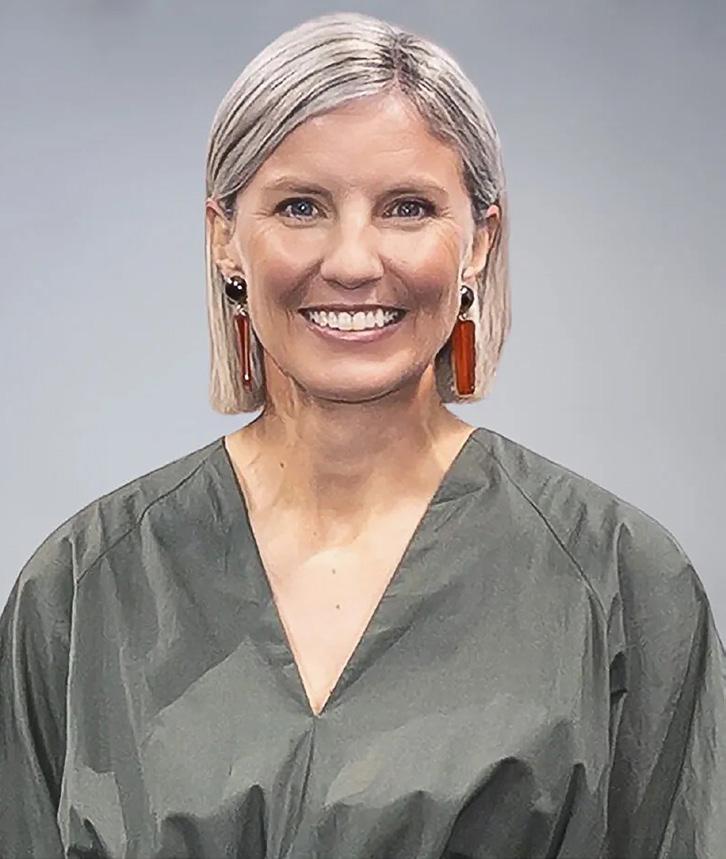
Karin Rådström, CEO, Daimler Truck
With a history in the Middle East dating back to the 1950s, Mercedes-Benz Trucks has long been a benchmark for performance, durability, and innovation in the region. Its partnership with E.A. Juffali & Brothers in Saudi Arabia led to the establishment of a joint venture in 1974 to manufacture commercial vehicles, and by 1977, the first locally assembled Mercedes-Benz truck rolled off the line in Jeddah—a pivotal milestone in the brand’s regional legacy.
Over the decades, Mercedes-Benz has deepened its roots across the GCC and MENA. In 2015, Daimler Commercial Vehicles MENA (DCV MENA) was established in Dubai’s Jebel Ali Free Zone to oversee sales, service, and distribution across 19 markets from Morocco to Pakistan. This move marked a new era of regional autonomy and responsiveness, enhancing aftersales capabilities and market alignment.
| HQ Dubai, UAE
| Year established in the region 1998
| Flagship products Actros, Arocs, Econic
Mercedes-Benz Trucks’ flagship models in the region include the long-haul Actros, built for fuel efficiency and safety; the rugged Arocs, designed for construction and heavyduty off-road use; and the Econic, tailored for municipal and utility fleets. Each vehicle is adapted to withstand the high ambient temperatures, challenging terrain, and operational demands of the Middle East.
A landmark moment came in 2016 with the handover of the 100,000th Actros in MENA— proof of the truck’s dominance and trust in the regional market. In Saudi Arabia alone, over 44,000 Actros trucks had been delivered by that time. Today, approximately one in ten Actros units produced globally operates in MENA.
As the region accelerates its transition to sustainable transport, Mercedes-Benz has taken decisive steps. In 2023, it launched its first fully electric truck—the eActros 300 L—in Saudi Arabia, in collaboration with Juffali Commercial Vehicles. This debut underlines the brand’s commitment to cleaner logistics and supports broader national visions like Saudi Arabia’s Vision 2030.
Adding to this momentum, in September 2024 Daimler Truck Holding AG announced that Karin Rådström, who joined the board in 2021 and has led Mercedes-Benz Trucks since, would become CEO effective October 1, 2024—bringing her strategic focus on electrification and sustainability to the global leadership role. She succeeds Martin Daum, who remained on the board through the end of 2024 to ensure a smooth transition.
With nearly 70 years in the region and a growing portfolio that now includes battery-electric options, Mercedes-Benz Trucks continues to shape the commercial vehicle sector— delivering cutting-edge technology, robust engineering, and an unwavering focus on uptime and fleet performance.
MAN Truck & Bus Middle East Africa CIS
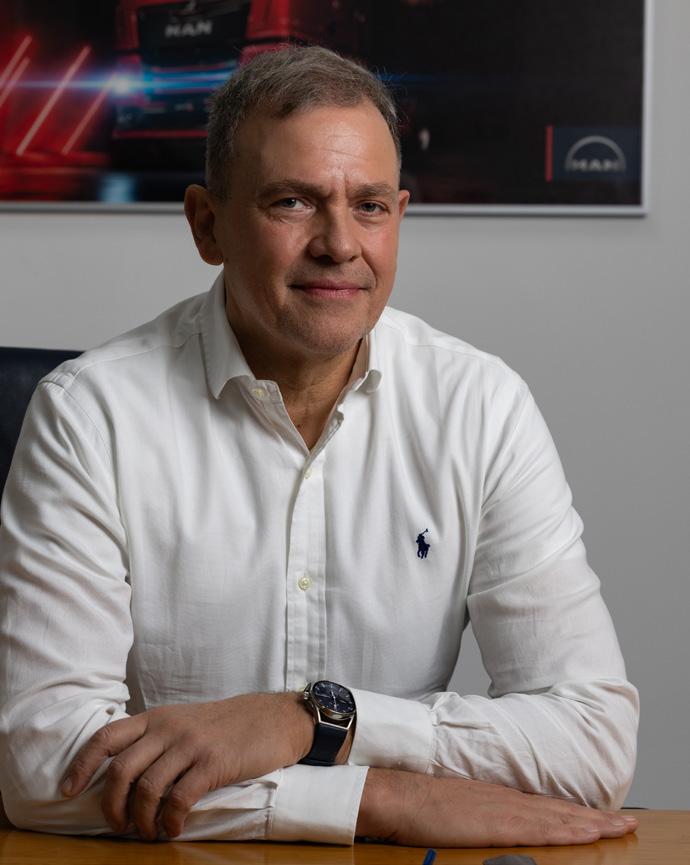
Joerg Mommertz, Senior Vice President & Head of CenterMiddle East, Africa, Latin America and CIS (MEALA & CIS) MAN Truck & Bus SE
| HQ Dubai, UAE
| Year established in the region 2006
| Flagship products
Light (TGL), medium (TGM), and heavy-duty (TGS WW, TGX) trucks; MAN and NEOPLAN buses; diesel and natural gas engines
With a legacy in the Middle East, Africa, and CIS region that stretches back over 90 years, MAN Truck & Bus has long been a trusted name in commercial transport. What began in 1928 has evolved into a wide-reaching regional presence, built through enduring partnerships with local importers. Since 2006, this footprint has been formalised under MAN Truck & Bus Middle East FZE, the regional representative office of MAN Truck & Bus SE, headquartered in Munich and part of the TRATON Group.
Today, MAN operates across more than 45 countries in the Middle East, Africa, and CIS, through a robust network of importers and private dealers. This includes operations in 14 Middle Eastern countries, over 25 in North, West, and Central Africa, and 6 across the CIS.
MAN’s product line is tailored to meet the tough conditions and high expectations of the region— delivering full-spectrum mobility solutions for both goods and passengers. The portfolio spans light (TGL), medium (TGM), and heavy-duty trucks (TGS WW and TGX), as well as MAN and NEOPLAN buses covering city, intercity, and luxury coach segments. The company recently expanded its offering with the introduction of the MAN TGE van range in select African markets. MAN also produces both diesel and natural gas engines, reinforcing its versatility across sectors.
Renowned for their durability, comfort, and safety, MAN vehicles continue to be a mainstay for fleets looking to balance performance with longterm dependability in some of the world’s most demanding logistics environments.

IVECO

Shahram Falati, Business Director, Africa & Middle East, IVECO
With a history in the region dating back to the 1950s, IVECO has steadily evolved into one of the Middle East’s most dynamic commercial vehicle brands—supported by strong regional partnerships, expanded after-sales infrastructure, and product line-ups tailored to the unique demands of Gulf and African roads.
In the UAE, IVECO’s partnership with Saeed Mohammed Al Ghandi & Sons (SMAG) entered a new chapter in 2024 with the launch of a state-of-the-art, multi-service hub in Dubai Industrial City. The facility features a full-fledged 24/7 service centre, a certified pre-owned truck sales showroom, and a spare parts warehouse that supports fleets across the country. This launch underscores IVECO’s long-term commitment to both the UAE and the wider Gulf region.
In Saudi Arabia—the region’s largest and most competitive truck market—IVECO made a strong impression in 2023 with
| HQ
Dubai, UAE
| Year established in the region 2004
| Flagship products
S-Way (on-road), T-Way (off-road), Eurocargo (medium-duty), Daily Hi-Matic (van)
the official launch of its latest heavy-duty lineup: the S-Way and T-Way. Introduced in partnership with Arabian Auto Agency (AAA), the two models represent IVECO’s “Way” range of trucks and were unveiled at a major event in Riyadh. The S-Way, designed for on-road applications, combines ergonomic cabin design with Euro V efficiency, improved aerodynamics, and smart fuel-saving systems. The rugged T-Way, purpose-built for off-road and construction environments, brings durability and torque to some of the region’s toughest terrains.
Both models are locally assembled in Saudi Arabia by Zeemat Manufacturing, aligning with IVECO’s wider vision for regionalisation and proximity to market. Fleet deliveries have already begun, with ARASCO receiving 20 S-Way trucks in 2023 under a tailor-made service contract that prioritises uptime and operational reliability.
Across its regional markets, IVECO continues to strengthen its after-sales and service network. AAA now operates four service branches and over ten spare parts outlets throughout Saudi Arabia, while SMAG supports a growing fleet base across the UAE.
Beyond diesel, IVECO is preparing its portfolio for the next era of transport. Globally, it leads in natural gas and alternative propulsion, with electric vans already available through its parent company’s Stellantis Pro One platform. As sustainability, digitalisation, and regional fleet growth converge, IVECO is strategically positioned to offer versatile transport solutions that meet today’s needs—and tomorrow’s ambitions.






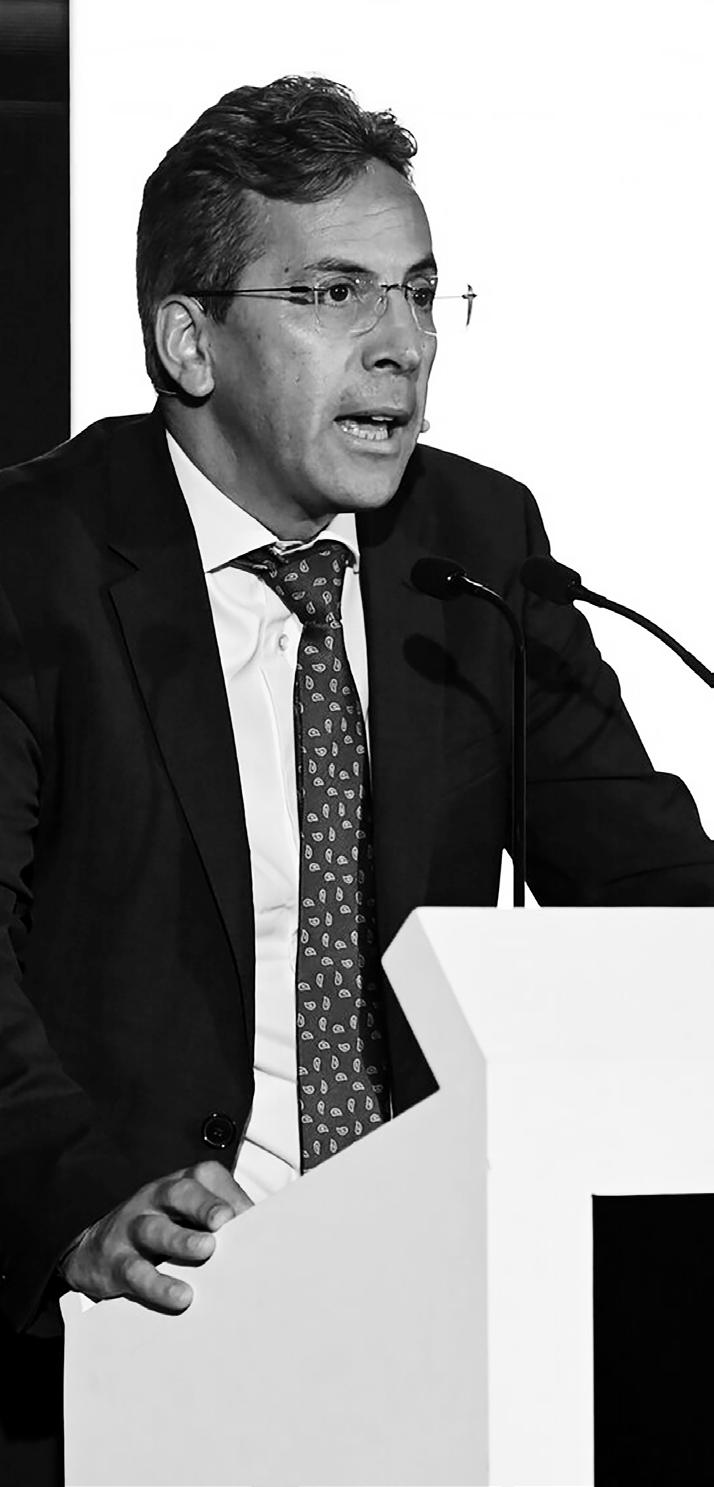
UD Trucks
| HQ
Dubai, UAE
| Year established in the region
2016
| Flagship products
Quester (Heavy Duty), Croner (Medium Duty), and Euro 5 versions tailored for GCC climate and emissions standards
UD Trucks, a subsidiary of Isuzu since 2021 and historically rooted in Nissan Diesel, has fast emerged as one of the fastest-growing heavy and medium-duty truck brands across the Middle East, East, and North Africa (MEENA). With a resurgence fueled by strategic product launches, strong regional partnerships, and relentless investment in after-sales support, UD Trucks is redefining commercial vehicle performance and support in the GCC.
At the strategic helm, Mourad Hedna, President of UD Trucks MEENA, has overseen consistent doubledigit growth for three consecutive years. In 2024 alone, the company reported a 30% year-on-year increase in sales, with a staggering 50% growth in GCC markets including Saudi Arabia, the UAE, and Qatar.
Product and Market Strategy
A pivotal moment in UD’s regional traction came with the rollout of Euro 5-compliant trucks in Saudi Arabia, assembled at the AVI facility in King Abdullah Economic City (KAEC), a joint venture between Zahid Tractor & Heavy Machinery and Volvo Truck Corporation. The upgraded Quester and Croner models deliver a 43% reduction in CO2 emissions compared to their Euro 4 predecessors, with extended service intervals for improved uptime and reduced total cost of ownership.
Regional Reach and Commercial Momentum
The company’s retail success has extended across major markets:
> In the UAE, UD Trucks broke records in 2023 with triple-digit sales growth, especially within the waste‑management sector. The fleet delivered some 300 trucks to Abu Dhabi, Sharjah, and other government and construction agencies.
> In Saudi Arabia, UD Trucks strengthened its leadership in both heavy-duty and medium-duty segments— especially in the 4×2 tractor and waste-management markets—supporting national economic diversification.
Mourad Hedna, President of UD Trucks MEENA
> In Qatar, Oman, Bahrain, and Kuwait, the brand sustained strong demand based on reliability, cost-efficiency, and customer satisfaction rankings.
Notably, UD Trucks is also contributing to high-profile projects such as Neom and the Red Sea development, supplying specialised vehicles and demonstrating long-term market trust.
Expansion into Africa
2024 was a landmark year for UD’s East Africa expansion. The brand re-entered the Kenyan market with Isuzu East Africa as its partner, hosting launch events in Nairobi and Mombasa. The company also debuted in Egypt with GB Auto, aiming to deliver sustainable freight and fleet transport solutions.
In Uganda, despite regional instability, UD secured second place in market share. Plans are underway to initiate local assembly and dealership expansion in Kenya in 2025, further strengthening its East Africa presence.
Customer Experience & Aftersales Strategy
UD Trucks puts customer support front and centre. With over 1,000 trucks under service contracts across MEENA, the company delivers tailored solutions for key logistics sectors like construction and waste management.
Significant upgrades to service centres in Dubai, Abu Dhabi, Qatar, Bahrain now offer improved facilities and seamless support capabilities. A new

customer-survey initiative captures actionable feedback at service locations, helping continuously refine TCO and user experience.
Training remains vital to UD’s brand proposition: in 2024, the company delivered 1,300 hours of technical training, 1,600 hours of commercial training, and 1,200 hours of systems training to employees. Its partner Zahid Tractor earned second place globally in the Gemba Challenge, reflecting the success of this competence-building strategy.
Customer-focused events like the Driver Guard Series (in Kuwait, Abu Dhabi, Bahrain) and Extra Mile Challenge (across Dubai, Qatar, UAE) reinforce UD’s human-centric approach, culminating in a global competition in Ageo, Japan.
Innovation & Sustainability Alignment
Aligned with regional sustainability goals, UD’s introduction of Euro 5 models significantly improves emissions and operational efficiency. Its Better Life brand promise highlights both environmental stewardship and practicality in fleet performance.
The company has also launched initiatives like the Plastic Pledge with the Arabian Ocean Rowing Team, underscoring its broader CSR commitment to societal and environmental wellbeing.
Looking Ahead into 2025
Entering 2025, UD Trucks MEENA remains laser-focused on growth, innovation, and customer value. With a healthy order book ahead of Q3 2025, the brand continues expanding across new markets including Egypt and Kenya, while consolidating leadership positions in the GCC. Future pillars include aftersales digitalisation (UD Connected Services, My UD Fleet), enhanced service centre presence, and expanded training and safety platforms for drivers and partners across the region.

Al Masaood TBA
| HQ
Abu Dhabi, UAE
| Year established in the region
1974
| Services
Tyres, lubricants, and full vehicle services through FirstStop centres across the UAE
For over five decades, Al Masaood Tyres, Batteries & Accessories Division (TBA) has been a key pillar of the UAE’s tyres and pitstop services market. As part of the Al Masaood Group, one of the country’s most established and diversified business conglomerates, TBA has grown from a trusted tyre supplier into a dynamic provider of mobility solutions, setting the standard for quality, reliability, and timely service.
With a strong presence across Abu Dhabi, Al Ain, and the Al Dhafra Region, Al Masaood TBA is the authorised distributor of the full Bridgestone and Petlas tyre range, servicing everything from private vehicles and trucks to industrial and earth-moving machinery. It is also the exclusive distributor of TotalEnergies lubricants in Abu Dhabi, Al Ain, and Al Dhafra region, supporting a wide spectrum of automotive maintenance needs through an integrated service model.
At the core of its operations is a retail and service network anchored by Bridgestone FirstStop, an international auto-care concept that TBA operates throughout its territories. These outlets offer more than just premium tyre brands. They also host “Rapid Oil Change” centres, where customers can access brake services, fluid replacements, and other vehicle pitstop solutions under one roof.
A Golden Year of Growth and Momentum
The year 2024 marked a pivotal milestone in the division’s journey: the 50th anniversary of its partnership with Bridgestone. More than just a celebration, the Golden Jubilee was a moment of reflection on decades of consistent growth and evolution in one of the world’s most demanding climates for transport and logistics. It was also a record-setting year for business performance, proving that TBA’s legacy is built on continuous forward motion.
Salah Adib, General Manager of Al Masaood TBA
Financially, the division recorded a 22% increase in gross profit margin and an 18% rise in operating profit compared to the previous year. These results were bolstered by strategic portfolio expansion and a keen understanding of regional market demands. Sales targets were exceeded across both the Passenger (PSR) and Truck & Bus Radial (TBR) tyre segments, driven in part by the launch of high-demand products such as Petlas Tyres, All Power Batteries, Eagle Lubricants, and a broader range of automotive additives.
Wholesale unit sales grew by 8%, reflecting the division’s strong response to the growing need for durable, allterrain and heat-resistant tyres, critical in a region where high-performance solutions are essential for safety and longevity. In particular, TBA’s offerings for SUVs, 4x4s, and commercial fleets have positioned it as a partner of choice for both individual and business customers.
Evolving the Customer Experience
2024 also saw the launch of AutoStop, a modern automotive service centre brand designed to deliver convenience, transparency, and comprehensive care in one seamless experience. Located in Al Quoz Industrial Area 3, Dubai, AutoStop reflects a strategic push to expand TBA’s retail presence beyond Abu Dhabi and elevate the overall customer journey.
Developed in collaboration with TyrePlus and Michelin, the Dubai branch offers a full suite of services, including tyre changes, brake and battery replacement, lubricants, and a wide range of mechanical services. The centre also prioritises comfort and visibility, featuring a spacious customer lounge with clear views of the workshop, ensuring customers feel confident and informed throughout the service process. A dedicated team of skilled technicians and service advisors reinforces AutoStop’s focus on safety, quality, and personalised care.
This expansion aligns with TBA’s broader efforts to diversify its footprint.
Its partnership with TyrePlus—an international network of independent tyre retailers—has further strengthened its service reach, enabling more customers to access premium support wherever they are.
As General Manager of Al Masaood TBA Salah Adib reflected on this milestone year, he noted that the division’s progress was about more than just numbers:
“2024 challenged us to evolve faster and think more strategically across every part of the business. We expanded our retail presence, introduced new products, and built stronger partnerships with both public and private sector players. The progress we made is a credit to the team’s discipline and ability to adapt in a fast-moving market.”
Indeed, one such collaboration was with the Abu Dhabi Police, supporting its annual Summer Safety Campaign to raise awareness about tyre safety and preventive maintenance, particularly vital during the UAE’s scorching summer months. Initiatives like this demonstrate how TBA’s influence extends well beyond commercial operations, shaping
industry standards and contributing to public safety.
What’s Next for Al Masaood TBA?
As Al Masaood TBA advances through 2025, its strategic roadmap remains focused on growth, innovation, and customer focus. Building on its milestone year, the division plans to deepen strategic alliances, further reinforcing its ability to meet the evolving needs of both retail and commercial clients.
The division’s dedication to excellence was recently recognised with the Gold Partner Award at the Majestic Mogul event, hosted by TotalEnergies in a reflection of the quality partnership and service standards that continue to define its brand.
With plans to grow the AutoStop brand and diversify its product portfolio, Al Masaood TBA is firmly positioned to deliver high-quality, accessible automotive solutions to a broadening customer base. Whether serving individual motorists, fleet operators, or government contracts, the division remains committed to setting industry benchmarks in safety, performance, and reliability.

Joby Aviation is bringing air taxis to Dubai, cutting a typical 45-minute commute to just 12 minutes. With exclusive operating rights and vertiports already under construction, the company is positioning the city as the starting point for a new era in urban air mobility. We spoke with Anthony Khoury, UAE General Manager, about timelines, technology, and what this means for the future of transport in the region

Dubai is set to be Joby’s first global launch site, why the Middle East, and why now? Dubai represents the ideal foundation for transforming global urban mobility. The emirate’s visionary leadership and progressive approach to emerging technologies create an optimal environment for launching and seamlessly integrating a new mode of transportation into the existing urban mobility landscape.
We believe our air taxi service will unlock tremendous time-saving benefits for residents and visitors traveling between Dubai’s key destinations – imagine cutting a typical 45-minute car journey from Dubai International Airport (DXB) to Palm Jumeirah down to just 12 minutes.
Through our landmark agreement with Dubai’s Road and Transportation Authority (RTA), signed in February 2024, we secured exclusive rights to operate air taxis in Dubai for six years.
Additionally, through our partnership with Skyports, we’re developing world-class vertiport infrastructure, with construction already underway at Dubai International Airport (DXB) and three additional locations planned at Palm Jumeirah, Dubai Marina, and Dubai Downtown.
Recently, we successfully completed piloted, vertical take-off and landing wingborne flights in Dubai marking the start of our commercial market readiness efforts in the region. These flights are testing Joby’s capabilities, from logistics to maintenance, in one of the markets we plan to operate in.
Furthermore, with 15+ years of engineering excellence and more than 40,000 miles of flight testing, our technology has demonstrated the operational readiness needed for commercial deployment.

From Dubai International Airport to Palm Jumeirah in 12 minutes, how are you rethinking time and distance in city logistics?
We’re fundamentally redefining urban mobility by shifting from two-dimensional ground networks to three-dimensional. The 12-minute Dubai International to Palm Jumeirah route exemplifies how we’re compressing time and distance—what traditionally requires 45 minutes by car becomes a brief aerial hop.
This isn’t just about speed; it’s about reimagining urban mobility entirely. Our approach transforms urban airspace into efficient transportation corridors, bypassing ground-level congestion completely. At up to 200 mph (320 km/h) and a maximum range of 100-miles (160 km), our air taxi creates new possibilities for connecting destinations while operating with zero-emissions and at noise levels that blend into urban soundscapes, being virtually imperceptible.

Dubai’s four planned vertiports—at Dubai International Airport (DXB), Palm Jumeirah, Dubai Marina, and Downtown— will create an integrated aerial transportation grid that complements existing ground transportation, representing a shift from linear, traffic-dependent routes to direct point-topoint connections.
How close are we to seeing eVTOL aircraft becoming a daily part of our logistics infrastructure, especially in fastgrowing cities like Dubai or Riyadh?
We’re closer than many realise: We’re targeting carrying our first passengers in Dubai in 2026. This timeline is supported by concrete progress across aircraft certification, infrastructure construction, and regulatory advancement.
We’ve initiated our Air Operator Certificate application with the UAE’s General Civil Aviation Authority, which involves a five-stage process. This builds on our existing U.S. Part 135 Air Carrier Certificate, which we’ve held since 2022.
As mentioned earlier, infrastructure development is already underway. Our vertiport at DXB is under construction, targeting Q1 2026 completion.
In Saudi Arabia, we’re building relationships across multiple fronts: we’ve signed an MoU with Abdul Latif Jameel to explore distribution and sales collaborations along with the launch of local air taxi services. We’ve also signed an MoU with Mukamalah Aviation, a wholly owned subsidiary of Saudi Aramco, to introduce our aircraft to the Kingdom and engage with key aviation stakeholders including the Saudi General Authority of Civil Aviation.
Are we likely to see Joby aircraft delivering cargo, medical supplies, e-commerce, or urgent goods, alongside passengers?
While our primary commercial focus remains passenger service, our aircraft’s capabilities naturally extend to logistics applications. We’re already demonstrating these possibilities through our extensive partnership with the U.S. Department of Defense (DoD), where our aircraft are being tested for logistics missions including cargo and passenger transportation at Edwards Air Force Base.
However, most of our focus remains on establishing passenger operations in urban environments.
Walk us through what makes Joby’s aircraft stand out, what’s the innovation that sets it apart from other players in the eVTOL space?
Our competitive advantage stems from four fundamental innovations: revolutionary acoustic design, unmatched safety architecture, vertically integrated development, and proven operational readiness.
From the outset, Joby’s goal has been to design and build an electric aircraft quiet enough to integrate seamlessly into urban environments. It’s a complex challenge that we tackled
Anthony Khoury, UAE General Manager, Joby

through innovative engineering from the ground up: we carefully considered everything from the number of propellers and blades to blade shape, tip speeds, and radius—all selected to minimise our acoustic footprint and improve the character of the sound produced.
Safety is at the core of everything we do. Our distributed electric propulsion architecture reduces single points of failure. Six electric motors with isolated battery packs provide multiple backup systems. Extensive failure injection testing at Edwards Air Force Base proved we can safely complete flights and execute controlled vertical landings even when operating on just four of six propellers during motor-out and batteryout scenarios.
Finally, vertical integration is our superpower. We design, build, test, and operate nearly every part of our service— from propulsion systems to pilot training and vertiport operations—completely in-house. This gives us end-to-end control over quality, performance, and certification, and accelerates our commercial readiness.
If you could summarise Joby’s mission to the Middle East logistics community in a single sentence, what would it be? Joby’s mission is to bring safe, quiet, and sustainable air
mobility to cities globally, fundamentally transforming how people move.
Our air taxi combines the efficiency of fixed-wing flight with the versatility of vertical take-off and landing, allowing passengers to move quickly across cities without adding pressure to existing road infrastructure.
What role do you see Joby playing in the Gulf’s vision for smart, connected, and sustainable cities by 2030?
Joby is helping build the three-dimensional mobility infrastructure that these smart cities need. In Dubai, we’re directly supporting His Highness Sheikh Mohammed bin Rashid Al Maktoum’s vision to make the UAE a world leader in advanced air mobility, while our Abu Dhabi partnerships demonstrate the breadth of support for advanced air mobility across the Emirates.
What’s really exciting is the potential we’re exploring to connect Emirates – zero-emissions flight between Abu Dhabi and Dubai in 30 minutes versus two hours by car. We’re not just providing transportation; we’re creating the seamless and sustainable connectivity that transforms individual cities into truly integrated smart regions.

Gulf?
Celestyal recently announced its expansion into the Arabian Gulf. What operational and logistical factors influenced this strategic move, and how are you positioning the brand to serve this highpotential region effectively?
Our expansion into the Arabian Gulf was a strategic decision shaped by multiple operational and commercial factors. Firstly, the region’s increasing popularity as a winter sun destination, alongside significant investment in cruise infrastructure, made it a natural extension of our year-round operation. From Doha to Abu Dhabi, regional authorities and tourism boards have shown strong commitment to
Celestyal’s CCO, Lee Haslett, shares how shifting traveller trends and strategic infrastructure are creating massive opportunity in the region
supporting the cruise sector, and we’ve forged longterm partnerships with organisations such as Visit Qatar, Ras Al Khaimah Tourism and DCT Abu Dhabi to ensure our growth is sustainable and impactful.
We’ve positioned Celestyal as the culturally immersive alternative to the big-ship programmes. Our mid-sized ships offer destination-rich itineraries that combine marquee cities like Dubai with lesserknown gems such as Khasab and Sir Bani Yas Island. The reception has been overwhelmingly positive - our first season in the Gulf tracked 35% ahead of our guest targets. Based on this success,


we’re committing two ships to the region over the next three winters, allowing us to offer both short-break and seven-night options to suit different travel preferences.
With your extensive background in aviation and tour operations, how do you see the cruise industry evolving in the Middle East, particularly when it comes to infrastructure, port partnerships, and regional collaboration?
THE ARABIAN GULF IS ALREADY SHOWING SIGNS OF BECOMING THE NEXT POWERHOUSE IN GLOBAL CRUISING. WHAT’S ENCOURAGING IS HOW ALIGNED THE VISION IS ACROSS THE REGION, FROM PORT AUTHORITIES TO TOURISM MINISTRIES, IN POSITIONING THE GULF AS A YEARROUND DESTINATION.
The Arabian Gulf is already showing signs of becoming the next powerhouse in global cruising. What’s encouraging is how aligned the vision is across the region, from port authorities to tourism ministries, in positioning the Gulf as a year-round destination. The collaborative mindset and investment appetite here are reminiscent of aviation’s evolution in the region two decades ago.
That said, the cruise sector has unique needs. Mid-sized and expedition-style cruising is growing, and this requires different berth configurations, tendering facilities and excursion frameworks compared
to larger vessels. We work closely with local stakeholders to ensure infrastructure development is not only suited to our fleet but also promotes meaningful local engagement. Our ability to access smaller ports and offer immersive, culturally anchored excursions gives us a distinctive edge – and one that resonates well with today’s more experience-driven traveller.
Trend wise, we are also seeing an increasing demand for packaged travel - especially among UK and North American guests to the Gulf region. We’ve listened and reacted and just last month announced a new tour operator model in the UK, Celestyal Travel, which enables us to package flights, hotel stays, cruises, transfers, onboard credit and shore excursions into one great deal for our customers. This essentially opens up the region to a wider audience, offering both region and cruisecurious travellers a host of inclusive travel options in the Gulf, as early as this year. We are committed to showcasing the best of the regions that we visit, and we believe this combination of cruise and land stay options is best for our guests and the local region.
IS THE NEXT CHAPTER WRITTEN IN THE GULF?

The launch of Celestyal Discovery and the brand’s investment in the Gulf indicate long term commitment. What logistical challenges and opportunities come with scaling small ship cruising in a region more commonly associated with mega-cruise liners?
Some ports are still scaling their infrastructure for a more boutique-style operation. Our size allows us to be agile, avoid crowding and offer guests a more intimate and personalised experience, which is increasingly what they’re looking for.
Logistically, there’s the opportunity to pioneer new ports. We’ve recently added Ras Al Khaimah as a port of call, developed exclusive shore excursions in partnership with local authorities and introduced
four new repositioning cruises through Jordan, Saudi Arabia, Oman and Egypt. These are destinations larger ships often overlook, and we’re proud to help open them up to international cruise guests. What’s key is that our fleet investments align with our business model. Both Celestyal Journey and Celestyal Discovery have undergone extensive upgrades to enhance operational performance, improve sustainability and expand premium accommodation, all of which are critical to scaling while maintaining quality.
How is Celestyal leveraging technology and digital platforms to streamline the customer journey and maintain efficiency across geographically diverse markets?
We recently launched a new guest-centric website and global trade portal, both major milestones in our digital transformation. The new Celestyal site features a frictionless booking engine, tailored itinerary recommendations and mobile-first design. We will soon be introducing AI-powered features such as our CelestyalPay calculator, which uses customer insight to suggest the required amount of onboard bar and specialty restaurant spend for their upcoming journey.

Lee Haslett, Celestyal’s CCO
On the trade side, we rolled out ‘The Celestyal Compass’, our one-stop portal for travel agents. It simplifies booking, centralises marketing materials and provides training tools globally. Our aim is to provide consistency and clarity across all markets, particularly as we grow our presence in the UK, North America, Australia and the GCC.
Operationally, we continue to invest in onboard technologies, from improved power management systems to the utilisation of locally sourced biofuels to ensure we are compliant with the strict sustainability measures in place in the regions that we visit. These ensure that while we scale, we maintain both efficiency and our environmental commitments.
As you lead Celestyal’s global commercial strategy, what role does the Middle East play in the broader roadmap for growth, and how do you foresee evolving customer behaviour influencing cruise itineraries and logistics planning in the region?
The Arabian Gulf is central to our longterm growth strategy. Our vision is to create unmissable moments at sea and ashore, and the
region allows us to do this in a way that’s both seasonally complementary and commercially viable. By homeporting in Abu Dhabi and Doha, we’re not only tapping into rising demand in the GCC but also attracting international guests who want to explore the region more deeply.
Customer behaviour is changing. Travellers today value authenticity, shorter itineraries and greater flexibility. Many are opting for experiences that connect them with local culture and provide value without compromising on quality. That’s exactly where Celestyal fits in.
We’re seeing growing interest in shorter, destination-intensive sailings that can be combined with land stays. This has influenced how we’ve shaped our three- and four-night Iconic Arabia cruises. Likewise, there’s increasing demand for overnight stays and late departures, giving guests more time to explore iconic cities like Dubai and Abu Dhabi. These behavioural shifts are directly informing our planning, both in terms of port partnerships and the style of experience we offer.

Built for
As the Gulf reinvents infrastructure, logistics real estate is emerging as a powerhouse for economic growth and investor returns

Words by: Vibha Mehta

Logistics infrastructure is undergoing a bold transformation across the Middle East, with contractors expanding their scope and reshaping regional real estate dynamics.
According to the Homecubes Logistics Real Estate UAE Report, the Middle East is witnessing a sharp uptick in logistics infrastructure development, propelled by rapid e-commerce expansion, economic diversification, and national visions like Saudi Arabia’s Vision 2030 and the UAE’s Operation
300bn. This shift has turned logistics real estate into one of the region’s most bankable sectors, as developers and contractors race to capture market share in a space once considered niche.
No longer confined to warehouses on the city’s periphery, logistics assets today are architected as smart hubs—modular, automated, and vertically integrated. Contractors such as ASGC and ALEC Engineering have expanded their offerings

INSTEAD OF SQUARE FOOTAGE AND CRANE SCHEDULES, CLIENTS NOW TALK ABOUT SUPPLY CHAIN ORCHESTRATION, EMISSIONS INTENSITY, AND AUTOMATION READINESS.
beyond traditional construction into logistics and industrial segments. Their involvement in build-to-suit distribution centres, last-mile fulfilment hubs, and cold storage facilities highlights a broader strategy to capture value across the supply chain.
Saudi Arabia is pushing boundaries with its mammoth investment in logistics zones and free economic cities. The King Salman Park and NEOM’s Oxagon are flagship developments not just for their scale but for their rethinking of logistics design. Oxagon, in particular, aims to become the world’s largest floating industrial complex, integrating automated ports with urban work-life ecosystems. Contractors involved here aren’t merely executing blueprints—they’re shaping future-ready urban logistics centres where people and goods move with unprecedented synchrony.
In Dubai, the Dubai Industrial City and Dubai South are seeing heightened development interest. DP World’s Jafza Logistics Park—spanning 5.5 million sq. ft.—is being upgraded with sustainability-focused facilities including solar-ready roofs and EV infrastructure. Aramex, DHL, and Amazon have all expanded their footprints in these zones, fuelling demand for highly specialised contractors capable of delivering temperature-controlled environments, green certifications, and sophisticated IoT-enabled operations.
For contractors, this is reshaping the very language of bids and builds. Instead of square footage and crane schedules, clients now talk about supply chain orchestration, emissions intensity, and automation readiness. Tier 1 contractors are responding with dedicated industrial divisions and in-
house design teams fluent in logistics demands. The result is a new breed of EPC contractors who straddle infrastructure, technology, and sustainability.
A case in point is the Abu Dhabi-based National Projects & Construction (NPC), which recently secured a design-and-build logistics contract in KEZAD for a major multinational logistics player. The facility includes AI-powered sorting systems, solar arrays, and robotic racking—an ecosystem designed as much for machine flow as for material handling. Similarly, KSA’s El Seif Engineering is delivering industrial corridors within the Red Sea Project and The Line that prioritise freight fluidity and zero-emission warehousing.
Adding to this momentum are purpose-built logistics real estate developers, such as Agility Logistics Parks and Gulf Warehousing Company, which are commissioning contractors to construct future-proof assets across Kuwait, Qatar, and Oman. In many cases, contractors are no longer just recipients of briefs—they’re integral design partners shaping the logistics ecosystem from the ground up.
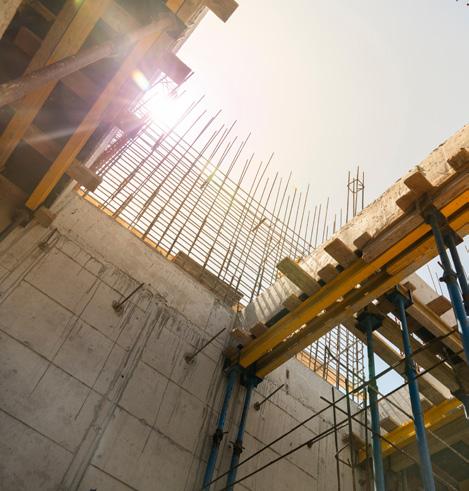
What makes this infrastructure wave especially potent is its long-term lens. It’s not just about serving today’s boom in e-commerce or FMCG—these projects are intended to serve circular economies, reindustrialisation, and geopolitical trade shifts. For instance, the UAE’s Etihad Rail project is a catalyst for multimodal freight hubs, with integrated logistics zones being tendered along its corridor. Contractors are already aligning with logistics developers to pre-design plug-andplay assets that will ride the rail boom.
Moreover, sustainability imperatives are now embedded in contracts. Clients demand LEED-certified logistics parks, netzero design options, and water reuse systems. This is spurring contractors to upskill in green building techniques and adopt more agile construction methodologies. Prefabrication, digital twins, and BIM-led workflows are standard across logistics builds, particularly as cost and time predictability become crucial in meeting fast-paced tenant demand.
Looking ahead, the symbiosis between logistics real estate and specialised construction expertise will become even tighter. With urban land becoming scarcer, vertical warehousing and multi-storey logistics are likely to define the next design evolution—requiring yet another leap in contractor capabilities. Meanwhile, with rising geopolitical focus on food security, pharma logistics, and AI-led trade, contractors are positioning themselves as enablers of national resilience through infrastructure.
In essence, the contractors building the Middle East’s logistics future are no longer just behind-the-scenes executors. They are co-architects of a smarter, greener supply chain landscape—transforming not just where goods are stored, but how regional economies function.
FOR INSTANCE, THE UAE’S ETIHAD RAIL PROJECT IS A CATALYST FOR MULTIMODAL FREIGHT HUBS, WITH INTEGRATED LOGISTICS ZONES BEING TENDERED ALONG ITS CORRIDOR.
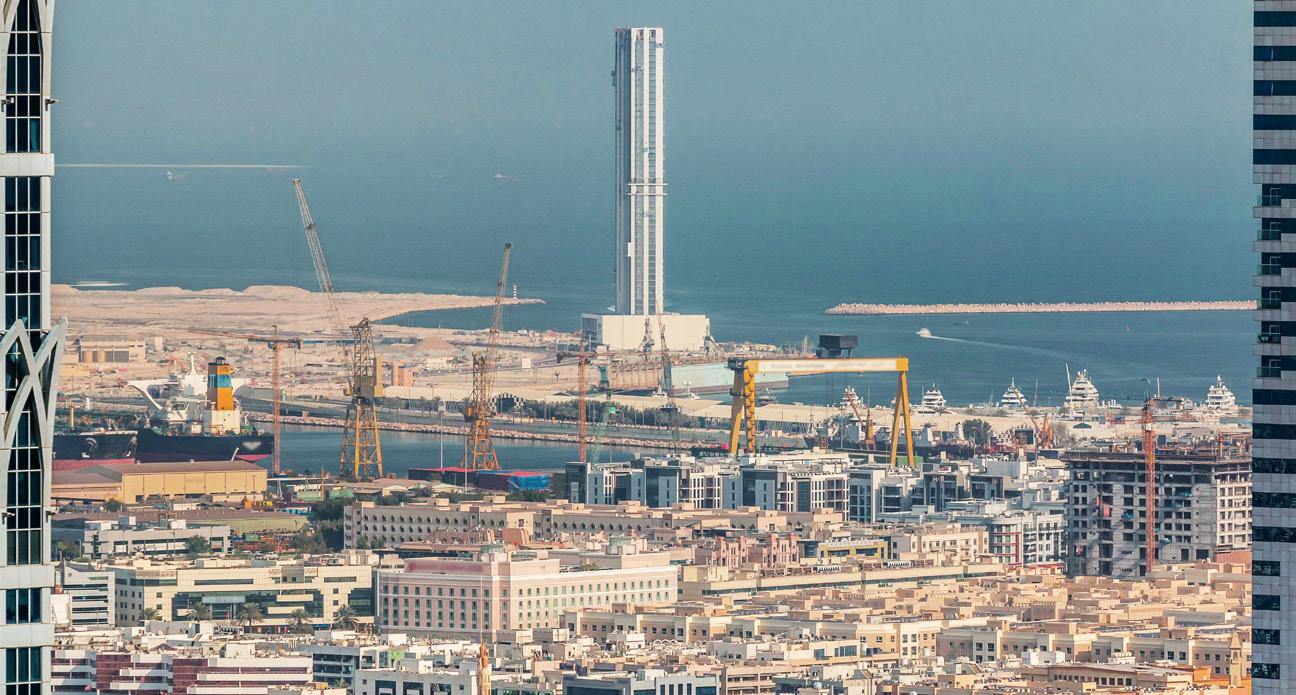




New report analysed by Swisslog reveals 93% of warehouses prioritise throughput as key to ROI
Anew global report from AutoStore, analysed by Swisslog, reveals that 93% of supply chain leaders rate improving throughput as a top warehouse priority in 2025, with nearly all surveyed (97%) having implemented some form of automation to date. With the Middle East logistics market set to double this year since 2020, the findings underscore the growing urgency for businesses to optimise automation and software capabilities to unlock higher performance and faster returns on investment.
The State of Warehouse Management and Fulfillment 2025 report surveyed over 300 global executives with supply chain responsibility, benchmarking automation trends, and identifying key operational priorities. Swisslog, a leading AutoStore integrator, examined the findings with a focus on how advanced warehouse execution and automation control software, such as Swisslog’s SynQ platform, can drive meaningful improvements in the metrics that matter most to regional businesses.
Key highlights from the report include:
> Throughput performance surges in priority: Improving throughput rose from the 8th highest priority in 2024 to 4th in 2025, with 93% of respondents citing it as “very” or “extremely important.”
> Software-driven optimisation: Advanced automation control software can unlock up to 20% increases in bin retrieval speeds by optimising bin selection and order batching.
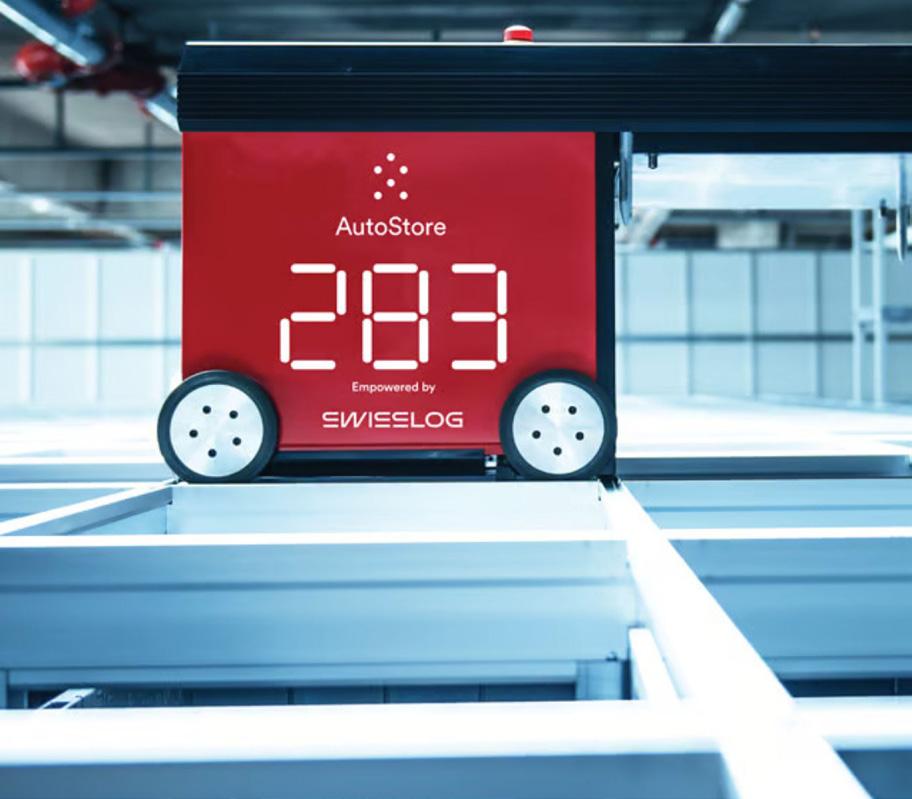
> Near-universal adoption of automation: 97% of warehouses have already implemented some form of automation, yet nearly half (48%) report being less than 50% automated, highlighting significant room for growth.
> Integration is critical: As automation levels expand, seamless software integration across multiple systems becomes vital to prevent operational complexity and ensure data-driven performance improvements.
The report also highlights how flexibility in automation software enables businesses to adapt to evolving customer demands, streamline omnichannel fulfilment, and maximise both throughput and storage density.
Commenting on the findings, Rami Younes, General Manager at Swisslog Middle East, said, “This year’s report makes it clear: automation alone is no longer enough. Businesses that want to stay competitive must also


Rami Younes, General Manager, Swisslog Middle East
focus on software that enhances performance and integrates seamlessly across technologies. In the Middle East, where we’re seeing fast growth in omnichannel retail and an e-commerce sector projected to reach USD 50 billion by 2025, the pressure to improve throughput, maximise density, optimise order fulfilment and adapt to demand spikes is mounting. Software is the key enabler of these capabilities.”
The report also warns of the risks of fragmented automation systems, which can lead to inefficiencies and limit the value of operational data. Swisslog’s SynQ platform addresses this by providing a single, unified software solution to manage and optimise automation assets.
As warehousing enters a new era of digital precision, the emphasis is shifting from automation alone to the orchestration behind it. The most resilient operations will be those that can harmonise speed, scalability, and intelligence turning throughput into a true measure of strategic performance.
THROUGHPUT ASCENDANT
Aerospace
logistics specialist B&H Worldwide strengthens its executive team with the appointment of seasoned industry leader
Matthew Warrington as Chief Commercial Officer
B&H Worldwide, the leading specialist in aerospace logistics, is pleased to announce the appointment of Matthew Warrington as its new Chief Commercial Officer, effective 1 August 2025.
Matthew brings to B&H Worldwide more than 30 years of senior leadership experience in international logistics, freight forwarding and supply chain management. He joins from Toll Global Forwarding, where he served as President and led the company’s strategy function.
Matthew’s appointment marks a strategic step forward in strengthening B&H Worldwide’s global commercial capabilities as the company continues to expand its footprint in key aerospace markets.
“We are delighted to welcome Matthew to the executive team at a pivotal time for our business,” said Stuart Allen, Group CEO of B&H Worldwide. “Matthew’s deep expertise

in strategy, logistics and commercial transformation combined with his experience across both the customer and operator sides of the industry will be instrumental in accelerating our growth and delivering long-term value to our customers.”
Prior to his role at Toll, Matthew was a Partner and Director at Boston Consulting Group, where he led the Supply Chain practice area for Australia and New Zealand. His extensive career also includes senior positions at Linfox, Visy Group and GrainCorp.
Matthew holds a Bachelor of Engineering (Chemical) and a Master of Business Administration (MBA) from the Melbourne Business School at the University of Melbourne. He is also an experienced company director and
non-executive chairman.
Commenting on his appointment, Matthew Warrington said: “I am thrilled to be joining B&H Worldwide at such an exciting stage in its growth. The company’s heritage, specialisation in aerospace logistics and global reputation for excellence set it apart in the industry. I look forward to working with the team to build on this strong foundation and shape the next chapter of commercial success.”
As Chief Commercial Officer, Matthew will be responsible for driving B&H Worldwide’s global commercial strategy, business development and customer solutions, strengthening the company’s position as the go-to partner for aerospace logistics and supply chain management.

INNOVATIVE CAR PARK SOLUTIONS



